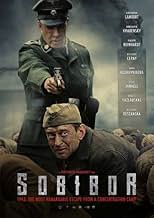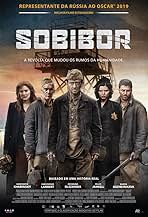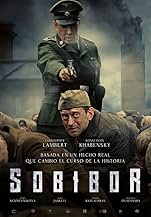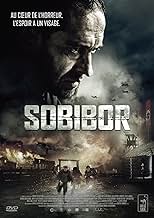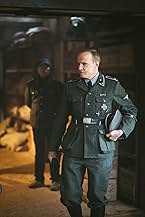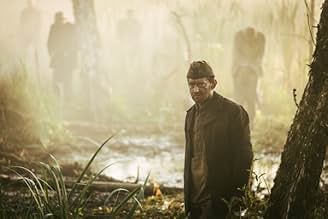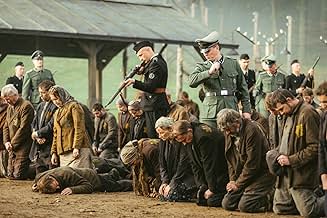CALIFICACIÓN DE IMDb
6.4/10
6.1 k
TU CALIFICACIÓN
Basada en los hechos reales del campo de exterminación Sobibor durante la segunda guerra mundial.Basada en los hechos reales del campo de exterminación Sobibor durante la segunda guerra mundial.Basada en los hechos reales del campo de exterminación Sobibor durante la segunda guerra mundial.
- Dirección
- Guionistas
- Elenco
- Premios
- 3 premios ganados en total
Konstantin Khabensky
- Alexander Pechersky
- (as Konstantin Khabenskiy)
Dainius Kazlauskas
- Leo
- (as Daynos Kazlauskas)
Michalina Olszanska
- Hanna
- (as Mikhalina Olshanska)
Mariya Kozhevnikova
- Selma
- (as Maria Kozhevnikova)
Yakov Mulerman
- Moses
- (as Jaa Mulerman)
Joshua Rubin
- Jakob
- (as Jowe Ruby)
Fabian Kociecki
- Chaim
- (as Fabian Kochenski)
Wolfgang Cerny
- Gustav Wagner
- (as Wolfgang Cherny)
Philippe Reinhardt
- Siegfried Greitschus
- (as Philip Reinhardt)
Wieslaw Cichy
- Józef
- (as Weslav Kichi)
Opiniones destacadas
Its a documentary more then a movie for me, not the way its filmed but i can't watch this as entertainment, because its a difficult movie to watch and its unbelievable what these people had to go through at the hands of the Nazi's
Worth watching as a rememberance to all the fallen and the survivors.
Powerful and underrated. This film will stay with me a long time, along with the true story it depicts.
Is it possible to "enjoy" a film of this type? I would argue "no", but this film succeeded in keeping me gripped and on the edge of my seat. It made me emotional and left me stunned at times. It left me yelling at the screen. I was very engaged and invested in the plight of those in Sobibor.
There are some really tough scenes here (as would be expected). Some scenes work better than others. The film was suffocating in its grittiness and overwhelming grief. Numerous nationalities are depicted here (of which I am none), so I'll leave that up to their respective people as to how accurate or authentic they are portrayed.
It wasn't until later that I discovered Konstantin Khabensky (who plays Sasha) co-wrote and directed the film too. I'm impressed. His performance itself was very moving.
This is the type of film that gets you reading the true story after. I have since been touched to learn more about the likes of Alexander 'Sasha' Pechersky, Stanislaw Szmajzner and other heroes.
The final scene gives you just enough time to absorb the events at Sobibor and to reflect on what happened during the Holocaust. Powerful stuff.
Is it possible to "enjoy" a film of this type? I would argue "no", but this film succeeded in keeping me gripped and on the edge of my seat. It made me emotional and left me stunned at times. It left me yelling at the screen. I was very engaged and invested in the plight of those in Sobibor.
There are some really tough scenes here (as would be expected). Some scenes work better than others. The film was suffocating in its grittiness and overwhelming grief. Numerous nationalities are depicted here (of which I am none), so I'll leave that up to their respective people as to how accurate or authentic they are portrayed.
It wasn't until later that I discovered Konstantin Khabensky (who plays Sasha) co-wrote and directed the film too. I'm impressed. His performance itself was very moving.
This is the type of film that gets you reading the true story after. I have since been touched to learn more about the likes of Alexander 'Sasha' Pechersky, Stanislaw Szmajzner and other heroes.
The final scene gives you just enough time to absorb the events at Sobibor and to reflect on what happened during the Holocaust. Powerful stuff.
Holocaust films are easily made exploitive, because, in the words of the late and great Roger Ebert,, "we do not need movies to convince us of the evil of ... the Holocaust," but rather, it is a subject better served in "films ... about the ways good men try to work realistically within an evil system to spare a few of its victims." To merely recount the violence that human beings are capable of perpetuating against each other makes for transgressive reflection rather than a useful one, because it denies us hope. Sobibor passes Ebert's test: From the first scene to the last, the horrors of the Holocaust are contrasted against the humanity of its victims and the courage that they ultimately find to rise up and fight back. It helps that the Sobibor camp is more cinematically satisfying, as it represents one of the only successful uprisings in concentration camps - 400 prisoners successfully escaped, led by Russian soldier Alexander Pechersky, and the third act breakout generates genuine tension as the heroes slowly begin to implement a plan that begins with individual acts of violence and ends with a convincing revolution. It is one of the great prison-breaks in the movies, made all the more jaw-dropping when the closing scroll reminds us that it is all true. In contract, Inglorious Basterds (a great film) had to create a fantasy ending that was as emotionally satisfying as the history featured in Sobibor.
The scenes leading up to the escape depict the daily lives of both soldiers and prisoners within the camp, in both its banalities and horrors, and there are some truly gory and disturbing moments here, but they never feel unnecessary because of the way that lead actor/director Konstaintin Khabenskiy depicts these events through the eyes of the prisoners who, slowly but surely, refuse to be victims any longer. Khabenskiy makes for a dogged and convincing hero, but it is Christopher Lambert's depiction of Karl Frenzel, the Nazi administrator of the camp, that really elevates the film's tension-Lambert plays the part as a man barely holding onto his sanity, having internalized the suffering that he constantly orders and witnesses. It is the most chilling portrait of an unhinged Nazi official since Ralpph Fiennes in Schindler's List. Less successful is Khabenskiy's decision to suggest a romantic connection between Pechersky and a female prisoner that he knew before the war, mainly because I struggled to believe an opportunity for such a romance convincing in this setting; nevertheless, this relationship is well-acted and leads to one of the best character exchanges in the film.
Sobibor is the Russian submission for the 91st Academy Award for best foreign language film. The film was shot in Lithuania, in six languages: Russian, Polish, German, Dutch, Yiddish, and English. This helps give the film the epic scope of a truly international production, and that is exactly what it feels like. This is one of the best films centered on the theme of the Holocaust that I have ever seen-well-acted, handsomely stages, filled with sobering imagery, and ultimately, a satisfying resolution that makes an often difficult journey worth taking. What begins as a tragedy ends as a victory; the film's success, and whether or not we accept the set-up of the first two acts, hinges on the execution of the escape. Khabenskiy absolutely delivers. I would be very happy to see this film appear on the list of nominees.
Christopher Lambert stars as Karl Frenzel SS non-commissioned officer in Sobibór who was sentenced to life imprisonment for his part in killing 150,000 jews until he was released in 1985 for poor health but died in retirement home near Hannover in 1996. The film shows the horrors of the camp and the plan to escape and the resulting escape but not as good as original film. The end titles were hard to read, but when i did were very interesting.
Holocaust is a very difficult subject to talk, far more difficult when it comes to the movies, because movies such as Schindler's List, The Pianist, Life is Beautiful and The Boy in the Striped Pyjamas have already set a high standards for the genre. "Sobibor" though a valiant attempt by director Konstantin Khabenskiy, to tell the tale of the only breakout from a concentration camp in the nazi occupied Poland, falters in many places.
The biggest problem of "Sobibor" is its character introduction, I believe it lacked detail and was pretty rushed, and it failed miserably in connecting to the minds of audiences. Cinematography was very good, along with production design, make up, costumes and music were par. Casting was a big let down. Acting barring a few scenes, was very average overall, not fitting to a movie of Holocaust genre. But it wasn't bad either. Editing could have been a little better, consider the material they had and the final cut. The usage of multiple languages in movie was rather confusing.
Overall, a good one time watch for audiences sans any expectations. "Sobibor" does has some really good & touching scenes, but has far too many flaws in its screenplay & dubbing. While it may not impress audiences who have watched all "great" Holocaust movies, it would be a good watch to young tech savvy audiences. Though there is nothing impressive in the movie apart from a few scenes, it's a "bit different" in comparison to the Holocaust movies of the past.
The biggest problem of "Sobibor" is its character introduction, I believe it lacked detail and was pretty rushed, and it failed miserably in connecting to the minds of audiences. Cinematography was very good, along with production design, make up, costumes and music were par. Casting was a big let down. Acting barring a few scenes, was very average overall, not fitting to a movie of Holocaust genre. But it wasn't bad either. Editing could have been a little better, consider the material they had and the final cut. The usage of multiple languages in movie was rather confusing.
Overall, a good one time watch for audiences sans any expectations. "Sobibor" does has some really good & touching scenes, but has far too many flaws in its screenplay & dubbing. While it may not impress audiences who have watched all "great" Holocaust movies, it would be a good watch to young tech savvy audiences. Though there is nothing impressive in the movie apart from a few scenes, it's a "bit different" in comparison to the Holocaust movies of the past.
¿Sabías que…?
- TriviaThe film was shot at once in five languages: Russian, Polish, German, Dutch and Yiddish.
- ErroresFrom approximately 30:55 to 32:52 Alexander Pechersky is chopping a tree in a swamp. The tree eventually falls. At 44:13 he chopping the same tree which is back in its standing position.
- Versiones alternativasThere are three versions. These are the running times for them: "1 hr 58 min (118 min), 1 hr 50 min (110 min) (Russia),1 hr 40 min (100 min) (South Korea)".
- ConexionesReferenced in Vdud (2017)
Selecciones populares
Inicia sesión para calificar y agrega a la lista de videos para obtener recomendaciones personalizadas
- How long is Sobibor?Con tecnología de Alexa
- This film has more details than Escape from Sobibor. When compared to actual events, was anything added to this film to make it more dramatic or was anything removed from Escape from Sobibor to make it simpler to understand?
Detalles
- Fecha de lanzamiento
- Países de origen
- Sitio oficial
- Idiomas
- También se conoce como
- Trại Tử Thần
- Locaciones de filmación
- Productoras
- Ver más créditos de la compañía en IMDbPro
Taquilla
- Total a nivel mundial
- USD 5,096,619
Contribuir a esta página
Sugiere una edición o agrega el contenido que falta


